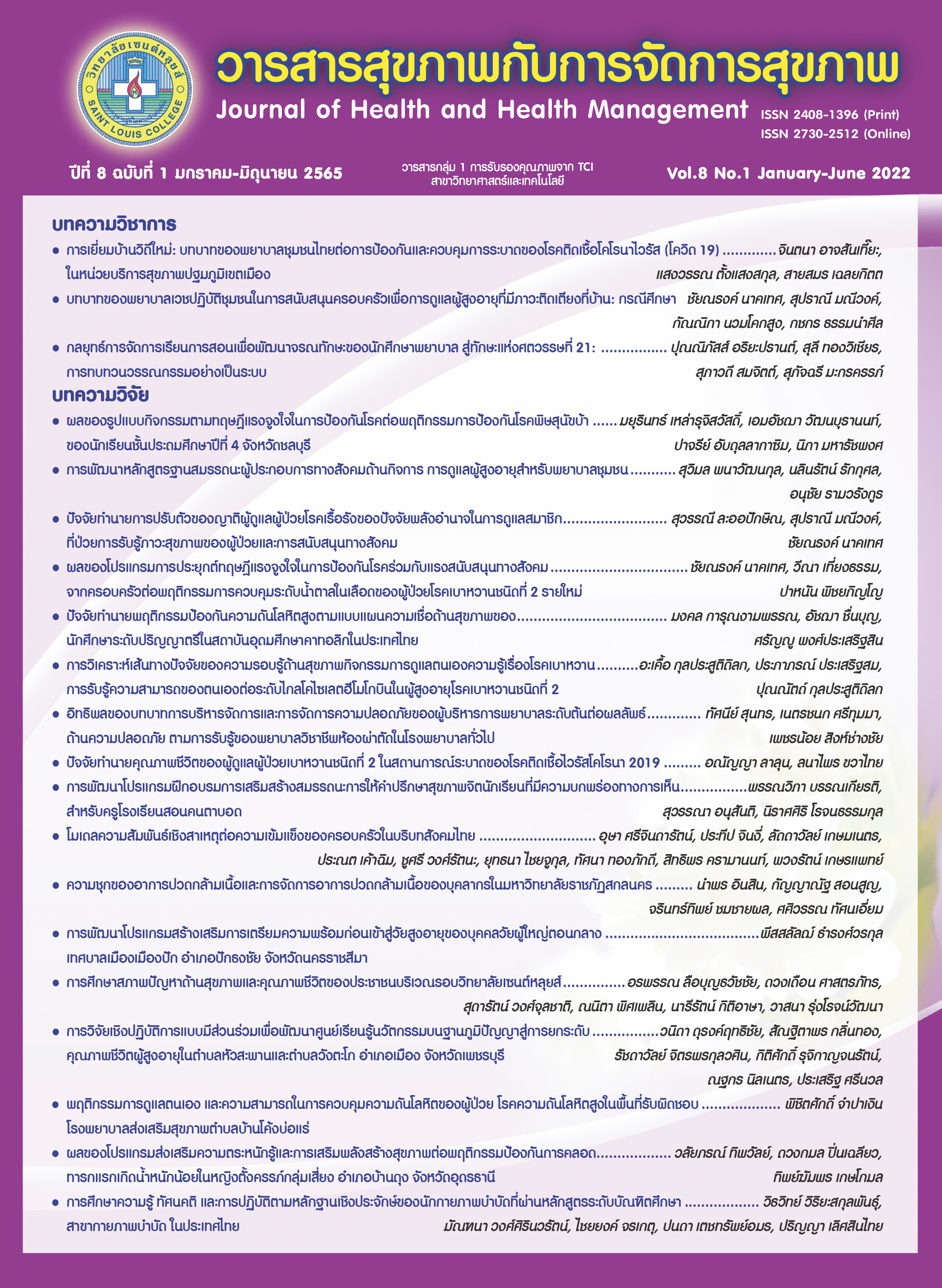The Participatory Action Research of Wisdom-based Elderly Innovation Learning Center Development for Quality-of-Life Improvement in Huasaphan Sub-district and Wang Tako Sub-district, Mueang district Phetchaburi Province
Keywords:
Development Learning Center, Wisdom-based, Innovation Elderly, Quality-of-LifeAbstract
This participatory action research aims to 1) study the context of the quality of life, the ability to access health and social services, and the elderly’s knowledge of herbal wisdom; 2) develop an innovative learning center for the elderly based on wisdom for Quality-of-Life Improvement, Hua-Sa-Phan Sub-district and Wang-Ta-Ko Sub-district, Mueang District, Phetchaburi Province. The sample consisted of 300 elderly people in Hua-Sa-Phan Sub-district and Wang-Ta-Ko Sub-district. In-depth questionnaires and interviews were analyzed by quantitative data such as percentage, mean, standard deviation and paired t-test, and qualitative data were analyzed by content analysis, quintessential analysis, and data verification.
The results showed that the overall quality of life of the elderly was moderate ( = 23.89, SD 4.21), the ability to access health and social services was moderate (
= 3.03, SD 0.42), and the elderly’s knowledge of herbal wisdom was at a fair level (
= 67.82, SD 0.99). A model for developing an innovation learning center for the elderly was based on wisdom using the SITCOM-Petch-Hua-Wang principle. After developing an innovation learning center for the elderly based on wisdom, it was found that the overall quality of life of the elderly and their access to health and social services were not significantly higher statistically. On the other hand, social welfare and health and knowledge of herbal wisdom were significantly higher (p 0.001), as well as the dimension of self-health behavior change.
In the next research, the key points of the innovator should be defined and summarized: innovation and an innovation learning center for the elderly to determine how to develop the potential of those involved to raise the quality of life for the elderly.
References
คัมภิรัตน์ แก้วสุวรรณะ. (2560). นวัตกรรมสังคมด้านพฤฒพลังในการพึ่งตนเองของผู้สูงอายุในจังหวัดนครราชสีมา. วารสารรังสิตบัณฑิตศึกษาในกลุ่มธุรกิจและสังคมศาสตร์, 2(2), 28-42.
นริสา วงศ์พนารักษ์, และสายสมร เฉลยกิตติ. (2557). คุณภาพชีวิต : การศึกษาในผู้สูงอายุไทย. วารสารพยาบาลทหารบก, 15(3), 64-70.
ปณดา รามไพบูลย์, ระวิวรรณ์ เจริญทรัพย์, รัชนี สรรเสริญและพิษณุรักษ์ กันทวี. (2561). การศึกษาประสิทธิผลของโปรแกรมการพัฒนาความรอบรู้ทางสุขภาพ ในการใช้สมุนไพรและผลิตภัณฑ์สมุนไพรของผู้สูงอายุที่ป่วยด้วยโรคความดันโลหิตสูง อำเภอแม่จัน จังหวัดเชียงราย.เชียงรายเวชสาร, 10(1), 81-92.
ปราโมทย์ ประสาทกุล. (2563). สถานการณ์ผู้สูงอายุไทย พ.ศ. 2562. นครปฐม: พริ้นเทอรี่
ภุชงค์ เสนานุช, และธนาชัย สุนทรอนันตชัย. (2562).การพัฒนานวัตกรรมทางสังคมเพื่อลดความเหลื่อมล้ำของผู้สูงอายุในบริบทเขตเมือง ในสังคมสงเคราะห์และสวัสดิการสังคม: การปลดล็อกความเหลื่อมล้ำสู่ความยั่งยืน. กรุงเทพฯ:คณะสังคมสงเคราะห์ศาสตร์ มหาวิทยาลัยธรรมศาสตร์.
มนต์ชัย อโณวรรณพันธ์. (2564). การพัฒนารูปแบบการเสริมสร้างความรอบรู้ด้านสุขภาพ ของผู้สูงอายุในจังหวัดอุทัยธานี.วารสารวิชาการกรมสนับสนุนบริการสุขภาพ, 17(1), 15-22.
ระพีพรรณ คำหอม, วรลักษณ์ เจริญศรี, และเล็ก สมบัติ.(2562).ชุดโครงการพัฒนานวัตกรรมทางสังคมเพื่อลดความเหลื่อมล้ำของผู้สูงอายุประเทศไทยระยะที่ 3 สนับสนุนทุนโดยสำนักงานกองทุนสนับสนุนการวิจัย. กรุงเทพฯ: สำนักงานกองทุนสนับสนุนการวิจัย.
วนิดา ดุรงค์ฤทธิชัย และหทัยชนก บัวเจริญ. (2562).รายงานวิจัยฉบับสมบูรณ์ โครงการพัฒนานวัตกรรมผู้สูงอายุเพื่อลดความเหลื่อมล้ำของผู้สูงอายุเขตชนบทในสังคมไทยระยะที่ 3 สนับสนุนทุนโดยสำนักงานกองทุนสนับสนุนการวิจัย. กรุงเทพฯ: สำนักงานกองทุนสนับสนุนการวิจัย.
วัชราพร เชยสุวรรณ. (2560). ความรอบรู้ด้านสุขภาพ : แนวคิดและการประยุกต์สู่ การปฏิบัติการพยาบาล. วารสารแพทย์นาวี, 44(3), 183-197.
วิไลพร ขำวงษ์, จตุพร หนูสวัสดิ์, วรารัตน์ ประทานวรปัญญา,และจิดาภา ศิริปัญญา. (2554). ปัจจัยที่มีความสัมพันธ์กับคุณภาพชีวิตของผู้สูงอายุ. วารสารวิจัยทางวิทยาศาสตร์สุขภาพ, 5(2), 32-40.
สมศักดิ์ อมรสิริพงศ์และอาชว์ภูริชญ์ น้อมเนียน. (2562).รายงานวิจัยฉบับสมบูรณ์ โครงการพัฒนานวัตกรรมผู้สูงอายุเพื่อลดความเหลื่อมล้ำของผู้สูงอายุเขตชนบทในสังคมไทยระยะที่ 3 สนับสนุนทุนโดยสำนักงานกองทุนสนับสนุนการวิจัย. กรุงเทพฯ: สำนักงานกองทุนสนับสนุนการวิจัย.
สุธิดา สุทธิรักษ์. (2558). ประสิทธิผลของโปรแกรมส่งเสริมพฤติกรรมการใช้สมุนไพรเพื่อสุขภาพของผู้สูงอายุตำบลนาใต้ อำเภอบ้านนาเดิม จังหวัดสุราษฎร์ธานี. วารสารการพัฒนาสุขภาพชุมชนมหาวิทยาลัยขอนแก่น, 3(3), 469-480.
Cai, T., Verze, P., & Bjerklund Johansen, T. E. (2021). The Quality of Life Definition: Where Are We Going?. Uro, 1(1), 14-22. https://doi.org/10.3390/uro1010003
Fernández-Gutiérrez, M., Bas-Sarmiento, P., & Poza-Méndez, M. (2019). Effect of an mHealth intervention to improve health literacy in immigrant populations: a quasi-experimental study. CIN: Computers, Informatics, Nursing, 37(3), 142-150. https://doi.org/10.1097/CIN.0000000000000497
Tavares, R. E., Jesus, M. C. P. D., Machado, D. R., Braga, V. A. S., Tocantins, F. R., & Merighi, M. A. B. (2017). Healthy aging from the perspective of the elderly: an integrative review. Revista Brasileira de Geriatria e Gerontologia, 20(6), 878-889. https://doi.org/10.1590/1981-22562017020.170091
World Health Organization. (1997). Program on mental health: WHOQOL Measuring quality of life. Geneva: WHO.
Downloads
Published
How to Cite
Issue
Section
License
Copyright (c) 2022 Journal of health and health management

This work is licensed under a Creative Commons Attribution-NonCommercial-NoDerivatives 4.0 International License.




